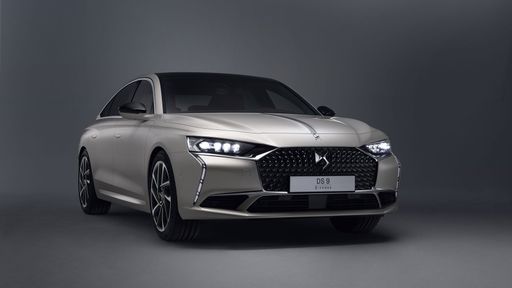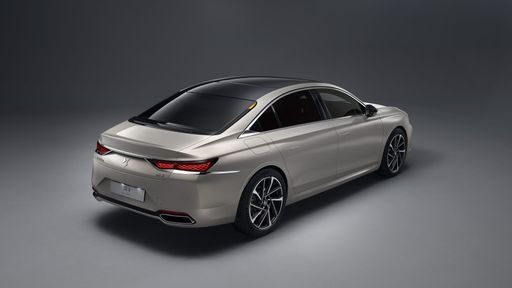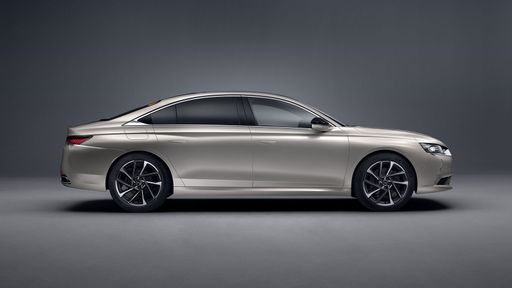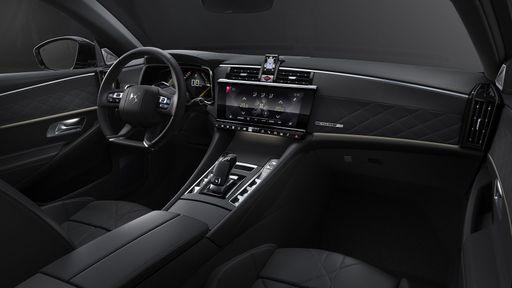DS Automobiles DS 9 VS Renault Trafic Bus – Specs, Efficiency & Price Comparison
Which model is the better choice – the DS Automobiles DS 9 or the Renault Trafic Bus? We compare performance (360 HP vs 150 HP), boot capacity (510 L vs ), efficiency (1.20 L vs 6.80 L), and of course, the price (55100 £ vs 38200 £).
Find out now which car fits your needs better!
The DS Automobiles DS 9 (Sedan) is powered by a Plugin Hybrid engine and comes with a Automatic transmission. In comparison, the Renault Trafic Bus (Bus) features a Diesel engine and a Manuel gearbox.
When it comes to boot capacity, the DS Automobiles DS 9 offers 510 L, while the Renault Trafic Bus provides – depending on what matters most to you. If you’re looking for more power, you’ll need to decide whether the 360 HP of the DS Automobiles DS 9 or the 150 HP of the Renault Trafic Bus suits your needs better.
There are also differences in efficiency: 1.20 L vs 6.80 L. In terms of price, the DS Automobiles DS 9 starts at 55100 £, while the Renault Trafic Bus is available from 38200 £.
Compare all the key specs now and find out which model fits your lifestyle best!
DS Automobiles DS 9
The DS 9 stands out in the luxury sedan segment with its elegant design and refined craftsmanship, embodying the essence of French automotive artistry. Inside, it offers a plush and sophisticated atmosphere, equipped with advanced technology that enhances both comfort and driving pleasure. With its emphasis on performance and style, the DS 9 is a compelling choice for those seeking a unique blend of luxury and dynamism on the road.
details @ media.stellantis.com
@ media.stellantis.com
 @ media.stellantis.com
@ media.stellantis.com
 @ media.stellantis.com
@ media.stellantis.com
 @ media.stellantis.com
@ media.stellantis.com
Renault Trafic Bus
The Renault Trafic Bus is a versatile and spacious option for those needing to transport multiple passengers comfortably. With its modern design and practical features, it is well-suited for both business and leisure purposes. Its efficient engine and smooth handling make it a reliable choice for long journeys.
details

|
|
|
|
|
Costs and Consumption |
|
|---|---|
|
Price
55100 - 74100 £
|
Price
38200 - 51100 £
|
|
Consumption L/100km
1.2 - 1.7 L
|
Consumption L/100km
6.8 - 7.2 L
|
|
Consumption kWh/100km
-
|
Consumption kWh/100km
-
|
|
Electric Range
62 - 75 km
|
Electric Range
-
|
|
Battery Capacity
-
|
Battery Capacity
-
|
|
co2
28 - 38 g/km
|
co2
179 - 188 g/km
|
|
Fuel tank capacity
42 L
|
Fuel tank capacity
80 L
|
Dimensions and Body |
|
|---|---|
|
Body Type
Sedan
|
Body Type
Bus
|
|
Seats
5
|
Seats
8 - 9
|
|
Doors
4
|
Doors
4
|
|
Curb weight
1864 - 1931 kg
|
Curb weight
2031 - 2321 kg
|
|
Trunk capacity
510 L
|
Trunk capacity
-
|
|
Length
4934 mm
|
Length
5080 - 5480 mm
|
|
Width
1855 mm
|
Width
1956 mm
|
|
Height
1459 mm
|
Height
1973 - 1974 mm
|
|
Payload
486 - 489 kg
|
Payload
749 - 982 kg
|
Engine and Performance |
|
|---|---|
|
Engine Type
Plugin Hybrid
|
Engine Type
Diesel
|
|
Transmission
Automatic
|
Transmission
Manuel
|
|
Transmission Detail
Automatic Gearbox
|
Transmission Detail
Schaltgetriebe
|
|
Drive Type
Front-Wheel Drive, All-Wheel Drive
|
Drive Type
Front-Wheel Drive
|
|
Power HP
250 - 360 HP
|
Power HP
110 - 150 HP
|
|
Acceleration 0-100km/h
5.6 - 8.1 s
|
Acceleration 0-100km/h
13.6 - 16.5 s
|
|
Max Speed
240 - 250 km/h
|
Max Speed
161 - 174 km/h
|
|
Torque
320 - 520 Nm
|
Torque
300 - 350 Nm
|
|
Number of Cylinders
4
|
Number of Cylinders
4
|
|
Power kW
183 - 265 kW
|
Power kW
81 - 110 kW
|
|
Engine capacity
1598 cm3
|
Engine capacity
1997 cm3
|
General |
|
|---|---|
|
Model Year
2021 - 2023
|
Model Year
2023 - 2024
|
|
CO2 Efficiency Class
B
|
CO2 Efficiency Class
G
|
|
Brand
DS Automobiles
|
Brand
Renault
|
DS Automobiles DS 9
The DS Automobiles DS 9 represents the pinnacle of luxury and innovation within the world of premium sedans. Blending sophisticated design with cutting-edge technology, the DS 9 has established itself as a noteworthy contender in a highly competitive segment. Let’s dive into what makes this model stand out, focusing on its technical aspects and innovative features.
Exquisite Design and Craftsmanship
From its sleek profile to meticulous detailing, the DS 9 exudes elegance. The sedan's exterior showcases an aerodynamic silhouette complemented by the iconic DS grille and distinctive light signatures. With a length of 4934 mm, width of 1855 mm, and height of 1459 mm, the DS 9 commands attention while providing ample interior space for comfort.
Inside, the DS 9 boasts a cabin constructed with premium materials, featuring fine leathers and luxurious finishes. The seating arrangement for five emphasizes comfort, and the trunk capacity of 510 liters adds practicality without compromising style.
Powerful Hybrid Engine Options
The DS 9 is available in several configurations, including the E-Tense 250 Plugin Hybrid and E-Tense 360 Plugin Hybrid. The E-Tense 250 variant features a powerful inline-4 engine that delivers 250 HP through a front-wheel-drive system, ensuring a smooth and dynamic driving experience. With a fuel consumption of only 1.2 L/100 km and an electric range of 75 km, it’s designed for efficiency as well as performance.
For those seeking more power, the E-Tense 360 variant offers an all-wheel-drive setup with a formidable 360 HP output. This model accelerates from 0 to 100 km/h in just 5.6 seconds, showcasing the potent capabilities of its 1.7-liter engine. The torque figures are equally impressive, with 520 Nm available in the E-Tense 360, providing exhilarating responsiveness on the road.
Innovative Technology for a Luxurious Drive
One of the highlights of the DS 9 is its commitment to integrating advanced technology. The sedan comes equipped with an automatic transmission that ensures smooth gear changes, enhancing the driving experience. Moreover, the CO2 efficiency class rated at B underlines its eco-friendly credentials, further appealing to environmentally-conscious drivers.
In the realm of entertainment and connectivity, the DS 9 doesn’t disappoint. It features a state-of-the-art infotainment system, including a large touchscreen interface, smartphone connectivity, and premium audio setups, ensuring that every journey is enjoyable.
Safety Innovations
The DS 9 is built with safety as a priority. It is equipped with multiple safety features designed to protect occupants and improve overall driving confidence. The presence of various driver assistance technologies, such as adaptive cruise control and lane-keeping assist, serve to enhance safety while maintaining a luxurious driving experience.
Conclusion: A New Standard in Luxury Sedans
The DS 9 is an innovative blend of luxury, performance, and cutting-edge technology. With its striking design, efficient hybrid options, and impressive safety features, it sets a new standard in the premium sedan market. Offering a comfortable ride and sophisticated aesthetics, the DS 9 is not just a car; it’s an experience that redefines modern automotive luxury.
Renault Trafic Bus
A Glimpse into the Renault Trafic Bus: An Icon of Versatility and Innovation
Amongst the plethora of vans designed for both business and leisure, the Renault Trafic Bus stands out as an exemplar of functionality, innovation, and style. Let's delve into what makes the Renault Trafic Bus a popular choice in the UK and across Europe, particularly focusing on its technical specifications and state-of-the-art features.
Performance Dynamics: Power Under the Hood
The Renault Trafic Bus, a staple in Renault's fleet, is driven by a robust diesel engine configuration with power outputs ranging from 110 PS to a formidable 170 PS. The diesel engines combine efficiency and power, offering torque figures between 300 to 380 Nm, ensuring smooth power delivery and capable load hauling.
Drivers can choose between manual and automatic transmissions, both designed to complement the Trafic's front-wheel-drive system. This flexibility ensures that drivers experience enhanced driving comfort whether they are navigating urban roads or cruising on the motorway.
Efficiency Meets Economy
The Trafic Bus showcases impressive fuel economy with consumption figures ranging from 6.8 to 7.2 litres per 100 kilometres. This efficiency is crucial for businesses aiming to minimise operational costs and for families seeking budget-friendly travel options.
With a generous fuel tank capacity of 80 litres, the Renault Trafic Bus is built to cover long distances with fewer fuel stops, making it an ideal choice for long haul journeys.
Technological Innovations and Comfort
The Trafic Bus isn't just about robust performance. Renault has integrated a suite of technological innovations designed to enhance driver and passenger comfort. Its cabins are equipped with the latest infotainment systems and safety technologies, providing an optimal blend of comfort and convenience.
The various trims, such as Life, Start, Spaceclass, and their respective EDC variants, cater to different needs and preferences, ensuring that customers can find the perfect configuration for their requirements.
Design and Dimensions: Space for Every Purpose
Space and versatility are at the heart of the Trafic Bus design. With its dimensions ranging from a length of 5080 to 5480 mm, and a width of 1956 mm, this vehicle offers ample room for passengers and cargo alike. The height stands between 1973 and 1974 mm, ensuring that even taller individuals can travel comfortably.
With seating for up to eight people and a payload capacity between 730 to 1010 kg, the Trafic Bus can transform seamlessly between a people-mover and a goods carrier.
Environmental Considerations
Renault has engineered the Trafic Bus with environmental responsibility in mind. The CO2 emissions range from 178 to 190 g/km, which, while modest for its class, aligns with the efficiency and performance goals set for this versatile vehicle. The CO2 efficiency class is rated as 'G', offering transparency in its environmental impact profile.
Conclusion: A Leader in Its Class
The Renault Trafic Bus continues to lead its segment through a blend of power, efficiency, and technological advancements. Whether it's for commercial transport or family adventures, the Trafic offers a reliable and adaptable solution, setting a high standard for multi-purpose vehicles.
For those seeking a distinguished blend of utility and comfort, the Renault Trafic Bus emerges as an exceptional choice, promising performance and innovation on every journey.
The prices and data displayed are estimates based on German list prices and may vary by country. This information is not legally binding.
